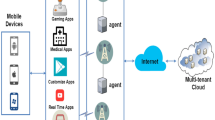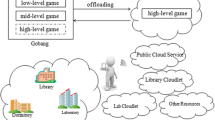Abstract
In mobile devices, one of the major reasons for battery consumption is due to computation of complex applications. To provide high performance of execution on the mobile devices, the concept of mobile cloud computing (MCC) is used. MCC allows the computation complex modules to offload onto a cloud from a mobile device, which helps to remove the resource constraint condition of the mobile devices. Computations can also be offloaded to nearby clouds called multi-sites, which may have different resources, access delays, computation capability or service charges. The mobile users can specify their priority such as total completion time, cost or energy saving of the application execution in MCC environment. But most of the existing research is focused to optimize only one objective, i.e., either total completion time or cost or energy. But when offloading computation modules onto cloud-based multi-sites, a tradeoff solution is required to strike a balance between the total completion time and energy savings. Further, the entire computational execution on the cloud is to be served efficiently with optimal power utilization. Various algorithms are developed to reduce power consumption, and one such algorithm is dynamic voltage and frequency scaling (DVFS) algorithm. In this paper, new algorithms known as cost and time constraint task partitioning and offloading algorithm (CTTPO), multi-site task scheduling algorithm (MTS) based on teaching, learning-based optimization and the energy saving on multi-sites (ESM) using DVS technique are proposed. CTTPO deals with trade-off between time and cost for the task partitioning and offloading. The MTS algorithm deals with time efficient scheduling on multi-sites, and ESM algorithm saves the energy on the multi-sites by switching the sites from high voltage to low voltage during ideal time. The simulation study demonstrates that the proposed algorithms outperformed the existing techniques based on time, cost and energy parameters.











Similar content being viewed by others
References
Ahmed E, Naveed A, Gani A, Hamid SHA, Imran M, Guizani M (2017) Process state synchronization for mobility support in mobile cloud computing. In: IEEE international conference on communications, pp 1–6
Bheda HA, Lakhani J (2013) Application processing approach for smart mobile devices in mobile cloud computing. Int J Adv Res Comput Sci Softw Eng 3(8):1046–1054
Deng S, Huang L, Taheri J, Zomaya AY (2014) Computation offloading for service workflow in mobile cloud computing. IEEE Trans Parallel Distrib Syst 26:3317–3329
Dinh HT, Lee C, Niyato D, Wang P (2013) A survey of mobile cloud computing: architecture, applications, and approaches. Wirel Commun Mob Comput 13(18):1587–1611
Gajbhe M, Sakhare SR (2015) Performance augmentation of mobile devices using cloud computing. Int J Comput Sci Inf Technol, 3581–3587
Goudarzi M, Zamani M, Haghighat AT (2017) A fast hybrid multi-site computation offloading for mobile cloud computing. J Netw Comput Appl 80:219–231
http://www.techrepublic.com/resource-library/whitepapers/765 resourHrBce-constrained-multi-user-computation-partitioning-for-766 interHrBactive-mobile-cloud-applications/. Accessed 10 Sept 2017 767
Islam M, Islam J (2016) A genetic algorithm for virtual machine migration in heterogeneous mobile cloud computing. In: 2016 International conference on networking systems and security (NSysS), Dhaka, pp 1–6, Jan 7–9
Kahng AB, Kang RKS (2013) Enhancing the efficiency of energy constrained DVFS designs. IEEE Trans Very Large Scale Integr Syst 21(10):1769–1782
Khanghani N, Ravanmehr R (2013) Cloud computing performance evaluation: issues and challenges. Comput 5(1):29–41
Kumar K, Lu YH (2010) Cloud computing for mobile users: can offloading computation save energy? Computer 43(4):51–56
Kumar K, Liu J, Lu Y, Bhargava B (2012) “A survey of computation offloading for mobile systems.” In Mobile Networks and Applications, pp. 1–12
Nguyen AD, Senac P, Ramiro V (2011) How mobility increases mobile cloud computing processing capacity. In: 1st International symposium on network cloud computing and applications (NCCA), pp 50–55
Pandit D, Chattopadhyay S, Chattopadhyay M, Chaki N (2014) Resource allocation in cloud using simulated annealing. In: 2014 Applications and innovations in mobile computing (AIMoC), IEEE, pp 21–27
Park S, Park J, Shin D, Wang Y, Xie Q, Chang N, Pedram M (2013) Accurate modeling of the delay and energy overhead of dynamic voltage and frequency scaling in modern microprocessors. In: IEEE T.CAD, pp 695–708
Rao RV, Savsani VJ, Vakharia DP (2011) Teaching-learning-based optimization: a novel method for constrained mechanical design optimization problems. Comput Aided Des 43(3):303–315
Rao RV, Savsani VJ, Vakharia DP (2012) Teaching-learning-based optimization: an optimization method fo continuous nonlinear large scale problems. Inf Sci 183(1):1–15
Shaukat U, Ahmed E, Anwar Z, Xia F (2016) Cloudlet deployment in local wireless networks: motivation, architectures, applications, and open challenges. Int J Netw Comput Appl 62:18–40
Shiraz Muhammad, Gani Abdullah, Ahmad Raja Wasim, Shah Syed Adeel Ali, Karim Ahmad, Rahman Zulkanain Abdul (2012) “A Lightweight Distributed Framework for Computational Offloading in Mobile Cloud Computing “ In Computer Science and Automation Engineering (CSAE). IEEE International Conference. 1:89–93
Shiraz M, Ahmed E, Gani A, Han Q (2014) Investigation on runtime partitioning of elastic mobile applications for mobile cloud computing. J Supercomput 67(1):84–103
Shu P, Liu F, Jin H (2013) eTime: Energy efficient transmission between cloud and mobile devices. In: INFOCOM, IEEE, pp 195–199
Sinha K, Kulkarni M (2011) Techniques for fine-grained, multi-site computation offloading. In: Proceedings of the 2011 11th IEEE/ACM international symposium on cluster, cloud and grid computing (CCGrid’ 11), pp 184–194, May
Terefe MB, Lee H, Heo N, Fox GC, Oh S (2016) Energy-efficient multisite offloading policy using Markov decision process for mobile cloud computing. Pervasive Mob Comput 27:75–89
Wang L, von Laszewski G, Dayal J, Wang F (2010) Towards energy aware scheduling for precedence constrained parallel tasks in a cluster with DVFS. In: Proceedings of CCGrid’2010, the 10th IEEE/ACM international conference on cluster, cloud and grid computing, pp 368 –377
Wu H, Huang D (2014) Modeling multi-factor multi-site risk-based offloading for mobile cloud computing. In: 2014 10th International conference on network and service management (CNSM), IEEE, pp 230–235
Wu H, Knottenbelt W, Wolter K, Sun Y (2016) An optimal offloading partitioning algorithm in mobile cloud computing. In: International conference on quantitative evaluation of systems,(LNCS, vol 9826), pp 311–328
Wu H, Wolter K (2014) Dynamic transmission scheduling and link selection in mobile cloud computing. In: Analytical and stochastic modeling techniques and applications, Springer, Berlin, pp 61–79
Xiang X, Lin C, Chen X (2014) Energy-efficient link selection and transmission scheduling in mobile cloud computing. IEEE Wirel Commun Lett 3(2):153–156
Yaqoob I, Ahmed E, Gani A, Mokhtar S, Imran M, Guizani S (2016) Mobile ad hoc cloud: a survey. Wireless Commun Mob Comput 16(16):2572–2589
Ying F, Lei G (2014) Optimal scheduling simulation of software for multi-tenant in cloud computing environment. In: 2014 Fifth international conference on intelligent systems design and engineering applications (ISDEA), pp 688–692, June
Zhang K, Mao Y, Leng S, Zhao Q, Li L, Peng X, Pan L, Maharjan S, Zhang Y (2016) Energy-efficient offloading for mobile edge computing in 5G heterogeneous networks. IEEE Access 4:5896–5907
Zhang L, Fu D, Liu J, Ngai ECH, Zhu W (2017) On energy-efficient offloading in mobile cloud for real-time video applications. IEEE Trans Circuits Syst Video Technol 27(1):170–181
Zong Z, Nijim M, Manzanares A, Qin X (2008) Energy efficient scheduling for parallel applications on mobile clusters. Cluster Comput 11(1):91–113
Author information
Authors and Affiliations
Corresponding author
Ethics declarations
Conflict of interest
The authors declare that they have no conflict of interest.
Additional information
Communicated by G. Yi.
Publisher's Note
Springer Nature remains neutral with regard to jurisdictional claims in published maps and institutional affiliations.
Rights and permissions
About this article
Cite this article
Kumari, R., Kaushal, S. & Chilamkurti, N. Energy conscious multi-site computation offloading for mobile cloud computing. Soft Comput 22, 6751–6764 (2018). https://doi.org/10.1007/s00500-018-3264-0
Published:
Issue Date:
DOI: https://doi.org/10.1007/s00500-018-3264-0




